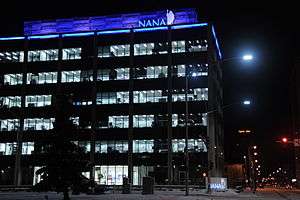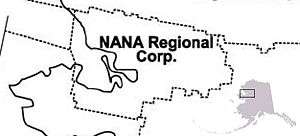NANA Regional Corporation
NANA Regional Corporation, Inc. (NANA) is one of thirteen Alaska Native Regional Corporations created under the Alaska Native Claims Settlement Act of 1971 (ANCSA) in settlement of Alaska Native land claims. NANA was incorporated in Alaska on June 7, 1972.[1] NANA is a for-profit corporation with a land base in the Kotzebue area in northwest Alaska. Its corporate office is in Kotzebue, Alaska. NANA's Alaska Native shareholders are of Inupiat descent.
The Northwest Arctic Native Association was NANA's predecessor, and played a key role in the effort to resolve Alaska Native land claims that led to passage of ANCSA. However, NANA is not an acronym today.

Mission
NANA states their mission as follows: "We improve the quality of life for our people by maximizing economic growth, protecting and enhancing our lands, and promoting healthy communities with decisions, actions, and behaviors inspired by our Iñupiat Ilitqusiat values consistent with our core principles."
Officers and directors
Board of directors
NANA is a shareholder-managed corporation that is guided by a Board of Directors, composed of Inupiat shareholders, and a senior management team. The 23 member NANA Regional Corporation, Inc. Board is elected solely by NANA shareholders. It is made up of two Iñupiat shareholder board members from each NANA village (with the exception of Kotzebue with one board seat) and an Elder Advisor.
Members
The following is a listing of the NANA board of directors, from the company's inception in 1972 to the present.[2][3]
- Ambler
- Miles Cleveland, Sr. 1972–1974
- Arthur Douglas 1974–1977
- Walter Gray 1976–1977
- Harriet Blair 1977–1981
- Arthur Douglas 1977–1980
- Miles Cleveland, Sr. 1980–2004
- Nellie A. Johnson (later Sheldon) 1981–1993
- Frank Johnson 1993–1996
- Wallace Cleveland 1996–1999
- Nellie A. Sheldon 1999–
- Gladys Jones 2004–
- Buckland
- Sigwien Savok 1972–1975
- Willie P. Thomas, Jr. 1975–1977
- George Washington 1976–1977
- Connell Armstrong 1977–1986
- Raymond Lee, Sr. 1977–1981
- Lucy Hadley 1981–1984
- Grace Washington 1984–1999
- Lester Hadley, Sr. 1986–?
- Raymond Lee, Sr. 1999–?
- Tony Jones, Jr. 2008–
- Alice Melton-Barr 2011–
- Deering
- Emerson Moto 1972–1977
- Gilbert Karmun 1976–1995
- ? 1977–1978
- Delores Barr 1978–1984
- Calvin Moto 1984–1990
- Martin Karmun 1990–1993
- Delores Barr 1993–2002
- Ronald Moto, Sr. 1995–
- Emerson Moto 2002–?
- Bonita Barr ?–
- Kiana
- Vincent Schuerch 1972–1985
- Christina Westlake 1976–1996 (chair 1989–1996)
- Charlie Curtis 1985–1992
- Raymond Stoney 1992–2000
- Thomas William Smith 1996–1999
- Johnnie Stoney 1999–?
- Jeanne Westlake (later Dellinger) 2000–2003
- Raymond Stoney 2003–?
- Ely Cyrus 2014–
- Marvin Barr 2015–
- Kivalina
- David Swan 1972–1982
- Lowell Sage 1976–1979
- Bert Adams, Sr. 1979–1991
- Lowell Sage 1982–1984
- Raymond Hawley 1984–?
- Becky Norton 1991–2003
- Mary Sage 2003–
- Myra Wesley ?–
- Kobuk
- Billy Tickett 1972–1976
- Tony Bernhardt 1976–1977
- Miles Cleveland 1976–1979
- Merna Cleveland 1977–1979
- Gertrude Bernhardt 1979–1981
- Wilson Tickett 1979–1988
- Rosie Ward 1981–1984
- Rosa Horner 1984–?
- Henry Horner, Sr. 1988–?
- Pearl Gomez 2008–
- Johnetta Horner ?–
- Kotzebue
- Tommy Sheldon, Sr. 1972–1977
- Marjorie "Marge" Baker 1977–1981
- Reggie Joule 1981–1990
- Frank Stein 1990–1996
- Paulette Lambert 1996–1999
- Dood Lincoln 1999–?
- Martha Whiting ?–
- Noatak
- Roland Booth, Sr. 1972–2010
- Gilbert Mills 1976–1988
- Axel Mills 1988–1994
- Frederica Schaeffer 1994–2003
- Robert J. Kirk 2003–?
- Joseph T. Luther 2009–
- Frank Adams, Sr. 2010–
- Noorvik
- Robert Newlin 1972–1989 (his death – chair 1972–1989)
- Alfred Wells, Sr. 1976–1994
- Donald G. Sheldon 1989– (chair 1996–2015)
- Thomas Pungalik, Sr. 1994–2000
- Fred Smith 2000–2003
- Wilbur Howarth 2003–?
- Robert Sampson
- Hendy Ballot, Sr. ?–
- Selawik
- Grant Ballot 1972–1977
- Roger Clark 1976–1977
- Bert Greist 1977–1989
- Ralph Ramoth, Sr. 1977–1979
- Diana Ramoth 1979–1981
- Diane Howarth 1981–1982
- Jane Jones (later Cleveland) 1982–1991
- Allen Ticket, Sr. 1989–1998
- Ralph Ramoth, Sr. 1991–2000
- Tommy Ballot, Sr. 1998–?
- Joe Ballot 2000–2003
- Allen Ticket, Sr. 2003–
- Diana Ramoth 2007–
- Shungnak
- Stanley Custer 1972–2001
- Levi Cleveland 1976–1997
- Eugene Douglas 1997–?
- Carl Foxglove 2001–?
- Linda Lee 2004– (chair 2015–)
- George Douglas ?–
- At-large
- Frank Ferguson 1972–1988
- William L. Hensley 1972–1992
- Luke Sampson 1988–2000
- John Schaeffer 1992–1995
- Robert "Bob" Curtis 1995–1998
- Frank Stein 1998–2001
- Al Adams 2000–2003
- Harvey Vestal 2001–
- Luke Sampson 2003–?
- Sarah Scanlan ?–
- Elder Representative/Advisor
- Levi Cleveland, Shungnak 1999–?
- Willie Goodwin, Kotzebue 2001–2002
- Roland Booth, Sr., Noatak ?–
Management
The NANA Regional Corporation, Inc. Senior Management Team, is led by Marie N. Greene. Donald G. Sheldon - NANA Regional Corporation, Board Chair Marie N. Greene - NANA Regional Corporation, President/CEO Gladys Pungowiyi - Chief Operating Officer, Vice President Kevin Thomas - Chief Financial Officer Walter Sampson - Vice President, Lands and Regional Affairs Dr. Lance Miller - Vice President, Resources E.J. Doll Garoutte - Vice President, Shareholder Relations Red Seeberger - Vice President, Administration Jackie Luke - General Counsel
Shareholders
Most of NANA's approximately 14,000 shareholders are Alaska Natives of Inupiat descent. As an ANCSA corporation, NANA has no publicly traded stock and its shares cannot legally be sold, though Class A, B and C stocks can be inherited or gifted. Unlike other American corporations, NANA - as an Alaska Native Corporation, has economic,social and cultural responsibilities to its shareholders. A wide variety of unique shareholders services are offered through the corporation.
NANA offers an internship program to its shareholders to provide them with on-the-job training, experience, skills. This training offers students career insights, exposure to the workplace and networking opportunities. NANA's mentoring program pairs shareholder employees with mentors who are managers in professional fields.
NANA region
The NANA region in northwest Alaska encompasses 38,000 square miles (98,000 km2), about the size of Indiana. Most of it is north of the Arctic Circle, and the region is coterminous with the boundaries of the Northwest Arctic Borough. The region has a population of about 7,300 people living in 11 communities. Of these, more than 85 percent of the region’s residents are Iñupiat, descendants of the first people who settled the region more than 10,000 years ago. The regional hub is Kotzebue; other villages include: Ambler, Buckland, Deering, Kiana, Kivalina, Kobuk, Noatak, Noorvik, Selawik, and Shungnak.
Subsistence plays a key role in the lives of the Inupiat. For centuries, they have relied on hunting and fishing. For most families in the region, the household economy is a mix of participation in these subsistence activities and full-time or part-time employment.Subsistence is not just economic necessity – it also plays a strong cultural and social role in the lives of NANA shareholders - and the preservation of subsistence resources is a vital element of the Inupiat cultural identity and values.
Lands

Until 1971, the issue of land ownership in Alaska was divisive. Oil was discovered on Alaska's North Slope and Alaska Native peoples, including the Iñupiat of northwest Alaska, worried about maintaining rights to traditional lands and the ability to protect their valuable subsistence resources. The passage of the Alaska Native Claims Settlement Act (or ANCSA) helped resolve many of the issues surrounding land rights.
ANCSA created 12 regional corporations in Alaska (a 13th was added later), and the state and Alaska Native groups worked together to select lands for each region. Each of these regions formed a for-profit corporation to manage these land rights.
Today, NANA owns 2,280,000 acres (9,200 km2), or approximately 9.4 percent of the 24,300,000 acres (98,000 km2) that comprise the NANA region. NANA lands encompass an area that is roughly the size of Indiana.
In 1972, a merger of the area’s regional corporation and ten of the eleven village corporations resulted in NANA’s ownership of both the surface and subsurface acreage, with the exception of the surface acreage Kikiktagruk Iñupiat Corporation (KIC) retained.
The land selection and conveyance process is now largely completed, but the work of our Lands Department continues to ensure that our rights are never again in question.
NANA-owned lands are managed by the NANA Lands and Regional Affairs Department.
Resources
NANA lands are part of the largest, unexplored on-shore basin in North America. The land is mineral-rich and NANA works with its partners to develop the resources to the benefit of its shareholders. NANA states that subsistence is the highest and best use of their lands and all projects must be in alignment with that priority. NANA is land-owner of the Red Dog Mine. The mine was developed in 1982 under an innovative operating agreement between NANA, a Native corporation owned by the Iñupiat people of northwest Alaska, and Teck Alaska, Inc. (Teck), a U.S. subsidiary of Teck Resources Limited, a diversified mining and metals company headquartered in Vancouver, British Columbia, Canada. NANA owns the land on which Red Dog Mine is situated, and NANA shareholders receive direct and indirect benefits from development at the mine.
Business enterprises
Under federal law, NANA and its majority-owned subsidiaries, joint ventures and partnerships are deemed to be "minority and economically disadvantaged business enterprise[s]" (43 USC 1626(e)).
NANA Regional Corporation's subsidiaries include:
- NANA Development Corporation (NDC). NDC oversees NANA business activity and cultivates developmental opportunities for NANA shareholders.
NDC owns companies that operate in engineering and construction; resource development; facilities management and logistics; real estate and hotel development; and information technology and telecommunications.
Facilities management and logistics
NANA Development Corporation is one of the largest hotel operators in Alaska. Its properties are managed through the NMS Lodging, the hotel division of NANA Management Services.
- Nullagvik Hotel. Located in Kotzebue.
- Courtyard By Marriott - Anchorage Airport. Located in Anchorage.
- Residence Inn By Marriott - Anchorage Midtown. Located in Anchorage.
- SpringHill Suites By Marriott - Anchorage Midtown. Located in Anchorage.
- SpringHill Suites By Marriott - University Lake. Located in Anchorage.
- SpringHill Suites By Marriott - Fairbanks. Located in Fairbanks.
Federal contracting services
Akima, LLC, , is a holding company that supports a diverse portfolio of federal and commercial service providers. Headquartered in Herndon, Virginia, Akima’s portfolio of operating companies play leadership roles in information technology, data communications, systems engineering, software development, cyber security, space operations, aviation, construction, facility management, fabrication, and logistics.[4]
Oilfield and mining support
- Red Dog mine. Northwest Arctic Region of Alaska. Zinc mine on NANA-owned land; operated in partnership with Teck Alaska. Many of NANA's companies and partners provide services for the mine, such as facilities management, housekeeping and food service.
- NANA Dynatec Mining. Headquartered in Anchorage. Mining services for both surface and underground operations, including turnkey mine development and contract mine operations.
- NANA/Lynden Logistics. Headquartered in Anchorage. Transportation and logistics support for the Red Dog Mine.
- NANA Major Drilling. Headquartered in New Brunswick, Canada. Drilling services for both surface and underground operations.
- NANA Oilfield Services, Inc.(NOSI). Headquartered in Anchorage. Provides support services to all major companies active in oil exploration or development on Alaska's North Slope.
References
- ↑ Corporations Database (NANA Regional Corporation, Inc.). Division of Corporations, Business & Professional Licensing, Alaska Department of Commerce, Community and Economic Development. Retrieved on 2007-03-18.
- ↑ Baenen, Richard Anthony, ed. (2004). NANA — A Continuing History. NANA Regional Corporation.
- ↑ "NANA Regional Corporation, Inc. (NANA) Board of Directors". About NANA. NANA Regional Corporation. 2015. Retrieved September 20, 2015.
- ↑ http://www.akima.com/about/
External links
- Official website
- Teck Cominco: Red Dog Mine
- Akima Management Services, Inc.. Retrieved on 2007-03-16.
- Akmaaq. Retrieved on 2007-03-16.
- Ki Professional Services Group. Retrieved on 2007-03-16.
- NANA Land Department. Retrieved on 2007-03-16.
- Qivliq. Retrieved on 2007-03-16.